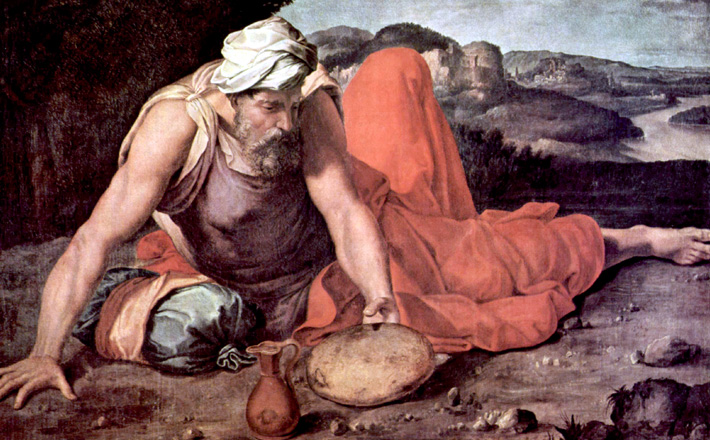Commentary on Isaiah 65:1-9
As I write this, the mass shootings of the past year are fresh in my mind.
That a person can shoot and kill large numbers of people, especially children, is something that we simply cannot understand. There must be a reason, we cry, for this incomprehensible violence. If such a reason cannot be found, we remain in this place of incomprehensibility, a terrifying place to be.
So we look for a place where we can lay responsibility for such horrific acts and such horrendous suffering. The shooter, of course, is responsible, but we recognize that he cannot be responsible alone; one pair of human shoulders seems too frail to bear the weight of such suffering. Thus we see that the responsibility is wider than one person, and, humans that we are, we turn that search for responsibility into a search for blame.
It’s the gun lobbies, we might say, who insist on keeping such dangerous weapons in people’s hands. Or no, we might say, it’s not the guns, but the very few mentally unstable persons who use guns to kill people. Or no, we might say, it’s the broken mental health care system that doesn’t provide such people with the help they need. Wherever we point the finger, we do make sure that finger is pointed; someone must take the blame for suffering that defies our understanding.
The Israelites who returned from exile in Babylon faced precisely this problem: how can we explain the immense suffering endured by the people of God? Second Isaiah (chapters 40-55), addressed to the Israelites near the end of the exile, expresses confidence in God’s command of history and the eventual restoration of the nation. Despite the people’s suffering, Second Isaiah promises a God who will continue to bless Israel:
But now hear, O Jacob my servant,
Israel whom I have chosen!
Thus says the Lord who made you,
who formed you in the womb and will help you: . . .
For I will pour water on the thirsty land,
And streams on the dry ground.
I will pour my spirit upon your descendants,
and my blessing upon your offspring (44:1-5).
These promises, however, are not fulfilled. The small groups of exiles who returned to Judah after Persia’s defeat of Babylon in 539 faced hardship, famine, political in-fighting, and economic oppression. How to account for this continued suffering, even after the promised return to their homeland has occurred? Third Isaiah, chapters 56-66, finds a way: it is God’s punishment for the people’s unfaithfulness.
What is this unfaithfulness? Verses 1-7 of chapter 65 delineate the people’s sins. The first two verses depict a God who longs to be sought by God’s people but who is continually shunted aside. God’s voice even sounds plaintive here; “Here I am, here I am,” God cries, to a nation that turns away. Specifically, the people have turned to the practice of pagan rituals. “Sacrificing in gardens” (verse 3) seems to refer to the practice of fertility rituals, and those who “sit inside tombs and spend the night in secret places” (verse 4) seem to be those who engage in rituals for consulting the dead. They eat the flesh of swine, and they consider themselves holy, set apart, by these practices, not because they belong to God. Such people, God proclaims, “are a smoke in my nostrils” (verse 5). The people’s disobedience and infidelity have made them repugnant to God.
The continued suffering of the Israelites, therefore, is just punishment for their sin, although not all of the people will receive God’s punishment. God “will repay into their laps their iniquities and their ancestors’ iniquities together” (verse 7) for the people’s actions. It is the people themselves who are responsible for their suffering; God cannot abide the unfaithfulness of God’s own people, but must destroy those who disobey. Yet God will not punish all; a remnant, a chosen few, will be redeemed, who will receive all that had been promised to Israel.
As the winemaker does not destroy a whole cluster because of one sour grape, so God will not destroy all of Israel, “for there is a blessing in it” (verse 8). Descendants of the Northern and Southern Kingdoms will inherit God’s holy mountain, and will settle there (verse 9). Even from among those who turn their backs on God, God will choose a remnant in whom the promises to Israel will be fulfilled.
So the problem of apparently meaningless suffering is solved in part, in Isaiah 65, by pointing the finger of blame squarely at the people themselves. What they have experienced is precisely what they deserve for their unfaithfulness to God. This assertion of retributive justice is not unusual in the Hebrew Scriptures; it is the reason Job’s friends give for his suffering. Ultimately, however, it is a poor response. The horror and terrible grief of inexplicable suffering, and the anxiety that we experience at that very inexplicability, can lead us desperately to seek someone to blame.
But blame does not reduce our suffering, nor does it relieve that elemental anxiety, and self-blame can cripple our very ability to seek the good. Blame does not restore hope, which, thankfully, the writer of this text knew also. Hope is found not in finger-pointing, but in Isaiah’s vision of the “new heavens and a new earth” that God is about to create, where “the former things shall not be remembered” (verse 17):
I will rejoice in Jerusalem,
and delight in my people;
No more shall the sound of weeping be heard in it,
or the cry of distress (verse 19).
The final word of Isaiah 65 on inexplicable suffering, then, is not divine retribution but eschatological hope. The writer points us toward that holy mountain where “the wolf and the lamb shall feed together” (verse 25), not as a pie-in-the-sky answer to what cannot be understood, but as a living reality that is breaking in to the world right now. It is the words of Third Isaiah that Jesus reads when he proclaims “the year of the Lord’s favor” in Luke 4:18, words that are fulfilled in Jesus’ very speaking of them.
The kingdom of God that is even now upon us does not explain our suffering, but it does provide succor for our pain. And it empowers us to go on living in the midst of uncertainty, knowing that there will be a day when the sound of weeping is no more.


June 23, 2013